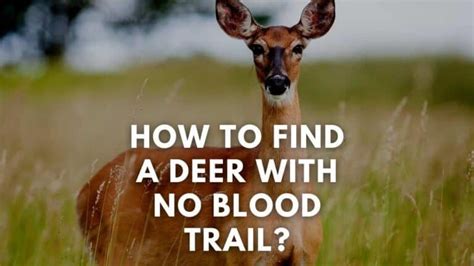How To Find A Deer With No Blood Trail
Ronan Farrow
Mar 31, 2025 · 3 min read

Table of Contents
How to Find a Deer with No Blood Trail
Tracking a deer after the shot can be challenging, especially when there's no visible blood trail. This situation requires a methodical and observant approach. Let's explore some effective strategies to increase your chances of finding your deer.
Understanding Why There Might Be No Blood Trail
Before we delve into tracking techniques, it's crucial to understand why a blood trail might be absent or minimal. Several factors can contribute to this:
- Shot Placement: A perfect, quick-killing shot often results in minimal bleeding. This is the ideal scenario, but unfortunately, not always the reality.
- Gut Shot: A gut shot can lead to internal bleeding, making a blood trail less visible or nonexistent initially. The deer might travel a considerable distance before succumbing to its injuries.
- Lung Shot (but not fatal): A lung shot that grazes the lung, might lead to less blood loss compared to a direct hit, potentially resulting in a faint or nonexistent trail.
- Muscle Shot: A shot that only hits muscle tissue will produce less bleeding than a vital organ hit. The deer might move surprisingly well, making tracking difficult.
- Shot Placement and Animal Movement: The direction and speed of the deer's movement after the shot greatly affects how visible the blood trail is. A deer running at high speed can wipe away blood evidence.
Strategies for Tracking a Deer Without a Blood Trail
If you're faced with a situation where there's no visible blood trail, don't despair. The following steps can help you locate your deer:
1. Mark the Last Known Location: Precisely mark the spot where you last saw the deer after the shot. This is your starting point.
2. The Immediate Area Search:
- Thorough Examination: Carefully examine the immediate area around your last sighting. Look for any signs of the deer's passage, like broken twigs, disturbed leaves, or footprints. Pay close attention to the ground and underbrush.
- Scent: Use your nose! A wounded deer might leave behind a distinct scent. While subtle, it can be helpful when combined with other clues.
- Listen for Sounds: Listen attentively for any sounds that might indicate the presence of the deer, such as rustling leaves or the occasional groan.
3. Expanding Your Search Radius:
- Systematic Approach: Start with a small radius around your last sighting and methodically expand your search in a spiral or grid pattern. This structured approach prevents overlooking key signs.
- Terrain Consideration: The terrain plays a significant role. If the deer was wounded, it will likely seek cover, such as dense brush or a ravine. Adjust your search pattern to match the terrain's features.
- Time is Crucial: The longer you wait, the harder it will be. A wounded deer can travel surprisingly far. Give yourself enough time but also don't delay indefinitely.
4. Utilizing Tracking Aids:
- Tracking Dogs: If you have access to a trained tracking dog, this is an invaluable asset. Their superior sense of smell often makes up for the lack of blood trail.
- Friends' Assistance: Don't hesitate to enlist help from experienced hunters to cover more ground and expand the search area efficiently.
5. Important Reminders
- Safety First: Always prioritize safety. Be cautious when navigating dense vegetation or uneven terrain.
- Respect Wildlife: Approach the situation with respect for the animal. If you find the deer, ensure a quick, humane dispatch if it's still alive and suffering.
- Learn from Experience: Every hunt presents valuable learning experiences. Reflect on what could have been done better, especially if the deer escapes.
Finding a deer without a blood trail requires patience, persistence, and meticulous observation. By following these strategies, you significantly increase your chances of a successful recovery. Remember, responsible hunting involves both the thrill of the chase and the ethical treatment of the animal.
Featured Posts
Also read the following articles
| Article Title | Date |
|---|---|
| How To Cook A Purple Artichoke | Mar 31, 2025 |
| How To Go To St Barths | Mar 31, 2025 |
| How To Get A Sbr Tax Stamp In Missouri | Mar 31, 2025 |
| How To Fix Loose Brake Pads | Mar 31, 2025 |
| How To Connect Brass To Pvc | Mar 31, 2025 |
Latest Posts
-
P1df3 How To Fix
Apr 03, 2025
-
Mother Half Pipe This Is How I Roll
Apr 03, 2025
-
Mommed Pregnancy Test How Early
Apr 03, 2025
-
Mary Oliver How I Go To The Woods
Apr 03, 2025
-
Macon Controls Thermostat How To Use
Apr 03, 2025
Thank you for visiting our website which covers about How To Find A Deer With No Blood Trail . We hope the information provided has been useful to you. Feel free to contact us if you have any questions or need further assistance. See you next time and don't miss to bookmark.
